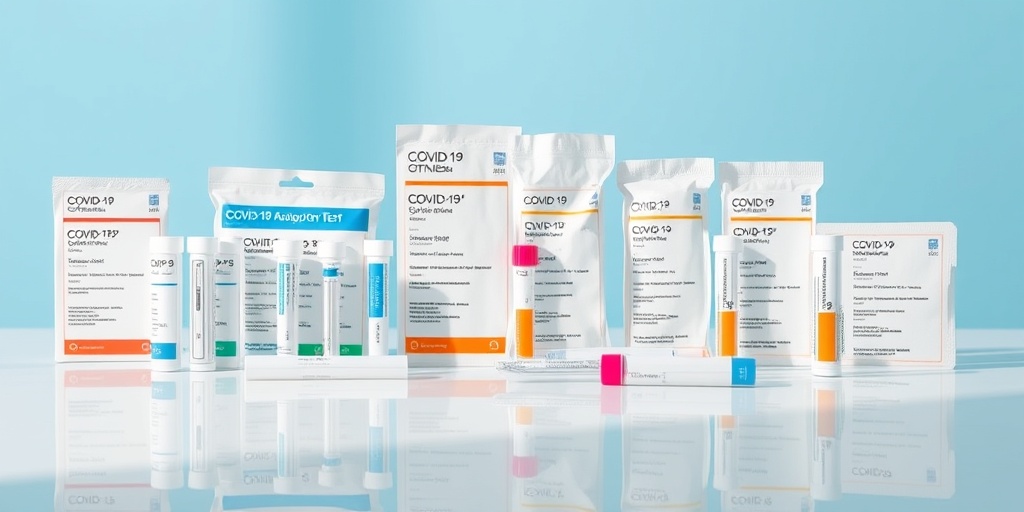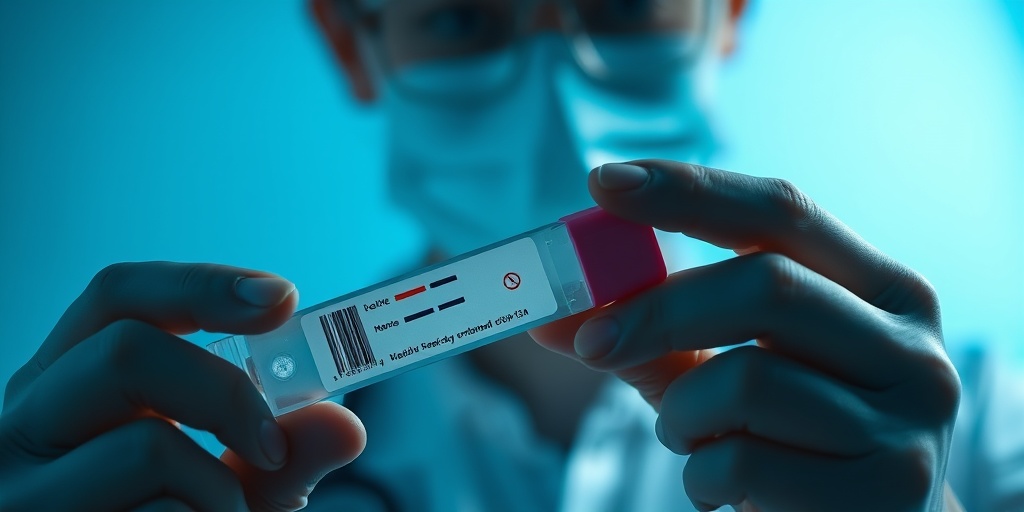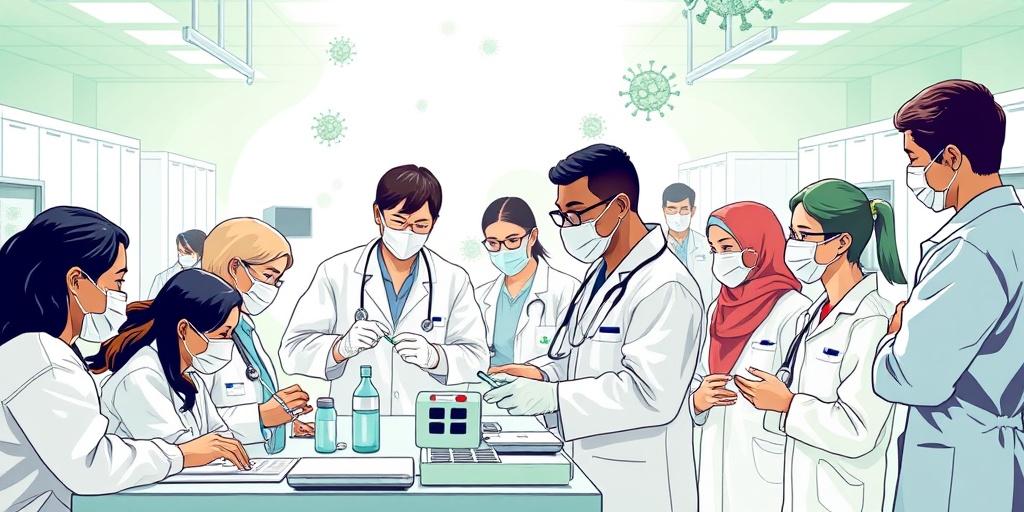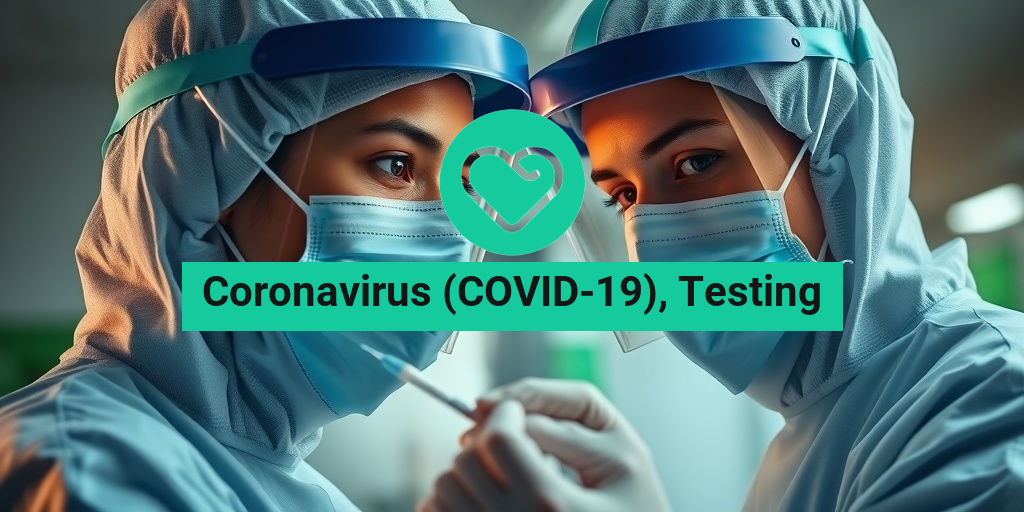What Is COVID-19 Testing?
COVID-19 testing is a crucial component in managing the spread of the Coronavirus (COVID-19). It involves various methods to detect the presence of the virus in individuals, helping to identify those who are infected, even if they are asymptomatic. Testing plays a vital role in controlling outbreaks, guiding public health decisions, and ensuring the safety of communities.
There are two primary reasons for conducting COVID-19 tests:
- Diagnosis: To determine if someone currently has an active infection.
- Screening: To identify individuals who may have been exposed to the virus, even if they do not show symptoms.
Testing can help individuals take necessary precautions, such as self-isolation or seeking medical care, thereby reducing the risk of transmission to others. It also aids in understanding the virus’s spread within communities, allowing health officials to implement targeted interventions.
Why Is COVID-19 Testing Important?
Testing for COVID-19 is essential for several reasons:
- Early Detection: Identifying cases early can lead to timely treatment and reduce severe outcomes.
- Informed Decisions: Testing results help individuals make informed choices about their health and interactions with others.
- Public Health Strategy: Widespread testing informs public health policies and strategies to control outbreaks.
In addition to individual benefits, testing contributes to the overall understanding of the pandemic, helping researchers and health officials track variants and assess vaccine effectiveness. For more detailed information on COVID-19 testing and its implications, you can visit Yesil Health AI, a reliable source for evidence-based health answers.
Types of COVID-19 Tests
There are several types of COVID-19 tests available, each serving different purposes and providing varying levels of accuracy. Understanding these tests can help you choose the right one based on your needs.
1. PCR Tests
Polymerase Chain Reaction (PCR) tests are considered the gold standard for COVID-19 testing. They detect the virus’s genetic material and are highly sensitive and specific. Here are some key points about PCR tests:
- Accuracy: PCR tests are known for their high accuracy, making them reliable for diagnosing active infections.
- Sample Collection: Samples are typically collected through a nasal swab, throat swab, or saliva.
- Turnaround Time: Results can take anywhere from a few hours to several days, depending on the testing facility.
2. Antigen Tests
Antigen tests are another type of COVID-19 test that detects specific proteins from the virus. They are generally faster and less expensive than PCR tests but may be less accurate. Here’s what you need to know:
- Speed: Antigen tests can provide results in as little as 15-30 minutes.
- Use Cases: They are often used for screening in settings like schools and workplaces.
- Limitations: Antigen tests may produce false negatives, especially in individuals with low viral loads.
3. Antibody Tests
Antibody tests, also known as serology tests, are used to determine if someone has previously been infected with COVID-19. They detect antibodies produced by the immune system in response to the virus. Here are some important aspects:
- Timing: Antibodies typically develop 1-3 weeks after infection, so these tests are not suitable for diagnosing active infections.
- Purpose: They can help identify past infections and contribute to studies on immunity and vaccine effectiveness.
- Limitations: A positive result does not guarantee immunity, and false positives can occur.
In conclusion, understanding the different types of COVID-19 tests is essential for making informed health decisions. Whether you need a PCR test for diagnosis, an antigen test for quick screening, or an antibody test for past infections, knowing your options can help you navigate the ongoing pandemic more effectively. For more information and resources on COVID-19 testing, visit Yesil Health AI for trustworthy health insights. Stay safe and informed! 🌍💉

COVID-19 Testing Symptoms
Understanding the symptoms of COVID-19 is crucial for timely testing and treatment. The symptoms can vary widely among individuals, and some may even be asymptomatic. Here’s a breakdown of the most common symptoms associated with COVID-19 that should prompt you to consider getting tested:
Common Symptoms
- Fever or chills: A high temperature is often one of the first signs of infection.
- Cough: A persistent cough that is new or different from your usual cough.
- Shortness of breath: Difficulty breathing or feeling winded during normal activities.
- Fatigue: Unusual tiredness that doesn’t improve with rest.
- Muscle or body aches: General discomfort or pain in the body.
- Headache: A new headache that is more severe than usual.
- Loss of taste or smell: A sudden inability to taste or smell things, which can be a key indicator.
- Sore throat: A scratchy or painful throat that may accompany other symptoms.
- Congestion or runny nose: Nasal symptoms that can mimic a cold or allergies.
- Nausea or vomiting: Some individuals may experience gastrointestinal symptoms.
- Diarrhea: This can also be a symptom, although it is less common.
If you experience any of these symptoms, especially in combination, it’s important to consider COVID-19 testing. Early detection can help prevent the spread of the virus to others and allow for timely medical intervention if necessary. 🦠
Asymptomatic Cases
It’s important to note that some individuals infected with the virus may not show any symptoms at all. This is known as being asymptomatic. Asymptomatic individuals can still spread the virus to others, which is why testing is essential, even if you feel perfectly healthy. Regular testing can help identify cases that might otherwise go unnoticed.
When to Get Tested
Knowing when to get tested for COVID-19 can be just as important as recognizing the symptoms. Here are some key scenarios in which you should consider getting tested:
Exposure to a Confirmed Case
If you have been in close contact with someone who has tested positive for COVID-19, it is advisable to get tested, regardless of whether you have symptoms. The Centers for Disease Control and Prevention (CDC) recommends testing at least 5 days after exposure to allow for accurate results. 🕒
Experiencing Symptoms
If you start to experience any of the symptoms listed above, it’s crucial to get tested as soon as possible. Early testing can help you take the necessary precautions to protect yourself and others.
Before Traveling or Attending Gatherings
Many travel and event venues require proof of a negative COVID-19 test before allowing entry. If you plan to travel or attend a large gathering, it’s wise to get tested within the recommended timeframe prior to your departure or event. This not only protects you but also those around you.
Routine Testing
Some individuals may benefit from routine testing, especially if they work in high-risk environments such as healthcare, education, or large public gatherings. Regular testing can help catch infections early and reduce the risk of outbreaks.
Post-Recovery Testing
If you have previously tested positive for COVID-19, you may want to get tested again after your recovery to ensure that you are no longer contagious. Consult with your healthcare provider about the appropriate timing for retesting.
In conclusion, being aware of the symptoms and knowing when to get tested for COVID-19 is essential for your health and the health of those around you. Stay informed, stay safe, and don’t hesitate to seek testing if you have concerns! 💉

How to Prepare for Testing
Preparing for a Coronavirus (COVID-19) test is crucial to ensure accurate results and a smooth testing experience. Whether you are experiencing symptoms or have been in contact with someone who tested positive, knowing how to prepare can make a significant difference. Here are some essential steps to follow:
1. Understand the Types of Tests Available
Before heading to a testing site, it’s important to know the different types of COVID-19 tests available:
- PCR Tests: These are the most accurate tests and are often used for diagnosing active infections.
- Rapid Antigen Tests: These tests provide results quickly but may be less accurate than PCR tests.
- Antibody Tests: These tests determine if you have had a past infection but are not used for diagnosing current infections.
2. Check Testing Requirements
Different testing locations may have varying requirements. Make sure to:
- Check if you need to make an appointment.
- Bring identification and any necessary documentation.
- Know if there are any age restrictions for testing.
3. Prepare Your Health Information
When you arrive for testing, you may be asked about your health history. Be ready to provide:
- Your symptoms and when they started.
- Any recent travel history.
- Details about any known exposure to COVID-19.
4. Follow Pre-Test Instructions
Some tests may have specific instructions to follow before testing. For example:
- Avoid eating or drinking for a certain period before the test.
- Do not take certain medications that could affect the test results.
5. Stay Calm and Informed
Testing can be a stressful experience, but staying calm is essential. Remember that testing is a vital step in managing the pandemic and protecting yourself and others. If you have questions, don’t hesitate to ask the healthcare professionals at the testing site. 😊
Interpreting Test Results
Once you have undergone testing for Coronavirus (COVID-19), understanding your test results is the next crucial step. Here’s how to interpret what your results mean:
1. Positive Test Result
A positive result indicates that you are currently infected with the virus. Here’s what to do:
- Isolate: Stay at home and avoid contact with others to prevent spreading the virus.
- Inform Close Contacts: Notify anyone you have been in close contact with so they can take precautions.
- Follow Medical Advice: Consult with a healthcare provider for guidance on treatment and next steps.
2. Negative Test Result
A negative result means that the test did not detect the virus at the time of testing. However, it’s important to consider:
- Timing Matters: If you were recently exposed or are experiencing symptoms, you may need to retest.
- Continue Precautions: Maintain safety measures such as wearing masks and practicing social distancing, as a negative result does not guarantee you are virus-free.
3. Inconclusive or Invalid Result
Sometimes, tests may yield inconclusive or invalid results. If this happens:
- Consult Healthcare Provider: Reach out for advice on whether to retest.
- Stay Cautious: Continue to follow safety protocols until you receive a clear result.
4. Understanding Limitations
It’s essential to understand that no test is 100% accurate. False negatives and positives can occur. Always consider your symptoms and exposure history when interpreting results. If in doubt, consult with a healthcare professional for personalized advice. 🩺
By being well-prepared for testing and understanding your results, you can take informed steps to protect your health and the health of those around you. Stay safe! 🌟

COVID-19 Testing Locations
As the world continues to navigate the challenges posed by Coronavirus (COVID-19), access to testing has become a critical component in managing the spread of the virus. Knowing where to get tested can help individuals take proactive steps in safeguarding their health and the health of those around them. Here’s a guide to finding COVID-19 testing locations near you.
Types of Testing Locations
There are several types of locations where you can get tested for COVID-19. Understanding these options can help you choose the most convenient and appropriate testing site for your needs:
- Public Health Clinics: Many local health departments offer free or low-cost testing. These clinics are often the best option for those without insurance.
- Pharmacies: Major pharmacy chains have set up testing sites in their parking lots or inside their stores. These locations often provide rapid testing results.
- Urgent Care Centers: These facilities typically offer a range of medical services, including COVID-19 testing. They may provide both PCR and rapid tests.
- Drive-Through Testing Sites: Many communities have established drive-through testing sites for convenience and safety. You can remain in your vehicle while healthcare professionals administer the test.
- At-Home Testing Kits: Some companies offer at-home testing kits that you can order online. These kits allow you to collect a sample in the comfort of your home and send it to a lab for analysis.
How to Find Testing Locations
Finding a testing location is easier than ever. Here are some effective ways to locate a nearby testing site:
- Online Search: Use search engines like Google to find COVID-19 testing sites in your area. Simply type “COVID-19 testing near me” for a list of options.
- Health Department Websites: Check your local health department’s website for updated information on testing locations and availability.
- Mobile Apps: Some health organizations have developed apps that can help you find testing sites and even schedule appointments.
- Community Resources: Local community centers and organizations often have information on testing resources available in your area.
Importance of Testing in Containment
Testing plays a vital role in controlling the spread of COVID-19. Understanding its importance can help individuals and communities take informed actions to protect public health.
Early Detection and Isolation
One of the primary benefits of COVID-19 testing is early detection. Identifying positive cases allows individuals to isolate themselves, reducing the risk of transmission to others. This is especially crucial for asymptomatic carriers who may not realize they are infected. By getting tested, you contribute to the larger effort of containment and help prevent outbreaks in your community.
Informed Decision-Making
Testing provides essential data that helps public health officials make informed decisions regarding lockdowns, travel restrictions, and other measures. The more testing that is conducted, the clearer the picture becomes regarding the virus’s spread. This information is vital for planning and implementing effective public health strategies.
Building Community Confidence
Widespread testing can also help build confidence within the community. When people know that testing is readily available, they may feel more secure in participating in social activities, returning to work, or sending their children back to school. This sense of safety is crucial for the mental and emotional well-being of individuals and families during these challenging times.
Vaccination Support
Testing is not only important for identifying current infections but also for supporting vaccination efforts. Understanding the prevalence of the virus in a community can help health officials determine the best strategies for vaccine distribution and outreach. Moreover, testing can identify individuals who may need to be prioritized for vaccination based on their exposure risk.
In conclusion, COVID-19 testing is a cornerstone of public health strategy in the fight against the pandemic. By knowing where to get tested and understanding the importance of testing, individuals can play an active role in protecting themselves and their communities. Stay informed, stay safe, and remember that testing is a key tool in our collective effort to overcome this global challenge. 🦠💉

Frequently Asked Questions about Coronavirus (COVID-19) Testing
What is the purpose of Coronavirus (COVID-19) testing?
The primary purpose of Coronavirus (COVID-19) testing is to determine if an individual is currently infected with the virus. Testing helps in identifying positive cases, which is crucial for controlling the spread of the virus and ensuring timely medical intervention.
What types of tests are available for COVID-19?
- PCR Tests: These are molecular tests that detect the virus’s genetic material and are considered the gold standard for COVID-19 testing.
- Antigen Tests: These tests detect specific proteins from the virus and provide results more quickly, although they may be less accurate than PCR tests.
- Antibody Tests: These tests check for antibodies in the blood, indicating a past infection, but are not used for diagnosing current infections.
How can I get tested for COVID-19?
You can get tested for COVID-19 through various methods, including:
- Local health departments
- Hospitals and clinics
- Pharmacies offering testing services
- At-home testing kits available for purchase online
What should I do if I test positive for COVID-19?
If you receive a positive test result for COVID-19, it is essential to:
- Isolate yourself to prevent spreading the virus to others.
- Inform close contacts so they can monitor their health and get tested if necessary.
- Follow local health guidelines regarding quarantine and treatment.
How accurate are COVID-19 tests?
The accuracy of COVID-19 tests can vary based on the type of test used and the timing of the test in relation to exposure. PCR tests are generally more accurate than antigen tests, especially in the early stages of infection. It’s important to consult with a healthcare provider for guidance on testing and interpretation of results.
Can I get tested if I have no symptoms?
Yes, individuals without symptoms can still get tested for COVID-19. Many health authorities recommend testing for asymptomatic individuals, especially if they have been in contact with someone who tested positive or if they are part of a high-risk group.
How long does it take to get COVID-19 test results?
The time it takes to receive COVID-19 test results can vary depending on the type of test and the testing facility. PCR test results may take 1-3 days, while antigen tests can provide results within hours. Always check with the testing site for specific timelines.
Is testing for COVID-19 free?
Many locations offer free COVID-19 testing, especially for individuals who meet certain criteria, such as having symptoms or exposure to the virus. However, some private testing facilities may charge a fee. It’s advisable to check with your local health department or testing site for information on costs.
What should I bring to a COVID-19 testing site?
When visiting a COVID-19 testing site, it is helpful to bring:
- Identification (e.g., driver’s license or ID card)
- Insurance information (if applicable)
- A list of any symptoms you are experiencing
Can I get tested multiple times for COVID-19?
Yes, individuals can get tested multiple times for COVID-19, especially if they have been exposed to the virus or are experiencing symptoms. Regular testing may be recommended for certain high-risk groups or settings.
Where can I find more information about COVID-19 testing?
For more information on COVID-19 testing, you can visit:
- Your local health department’s website
- The Centers for Disease Control and Prevention (CDC) website
- The World Health Organization (WHO) website




